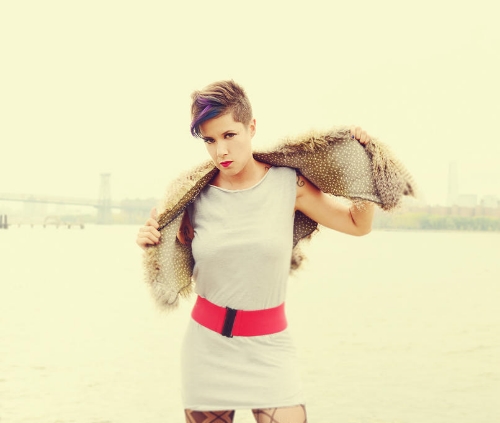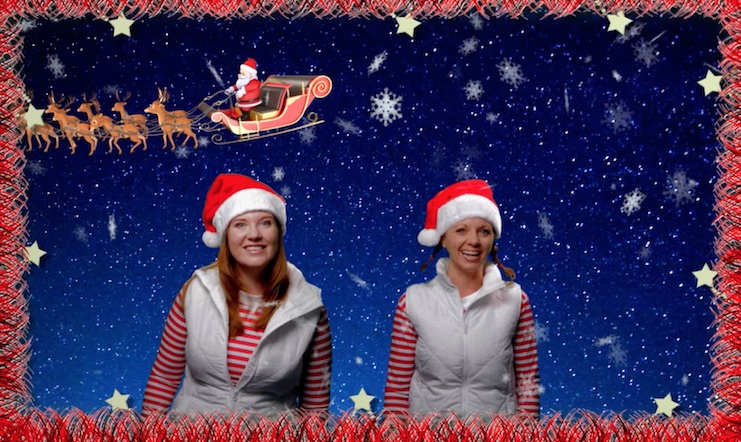Up above in the title for this interview, I've written "Moona Luna" after Sandra Velasquez, because if you're reading this website, you're probably most familiar with the New York-based Velasquez as the mastermind behind the bilingual Spanish kindie band.
But like many musicians, Velasquez wears a number of hats, and so it's just as likely that the intrepid Google-r will eventually find their way to this interview because they're fans of Velasquez's band Pistolera, the Spanish-language band she founded in 2005.
Or maybe you grooved to "Cheerleader," the leadoff single from SLV, the band featuring Velasquez and multi-instrumentalist Sean Dixon.
So there are a lot of reasons to listen to Velasquez, and I'm offering you one more -- the interview below, completed while Velasquez was on tour, and in which she talks about starting her musical life as a reluctant keyboardist, the impact of songwriting on her life, and the different audiences she plays to.
Zooglobble: What are your first musical memories?
Sandra Velasquez: I was forced to play piano as a child. So my earliest musical memories of are being forced to practice and playing piano recitals in lace dresses. I begged my parents to let me quit piano, which they did when I was 13. I bought my first electric guitar and started taking lessons immediately to learn all my favorite Nirvana, Hendrix, and other rock songs. Incidentally, the first band I played in when I was fifteen was as a keyboardist. We mostly practiced instead of gigging. Those were wonderful years because we were so naive in our freedom.
What inspired you to form Pistolera?
I moved to New York City the day after I graduated from music school in 1999 and spent that first summer completely in shock of the lack of Mexican and/or (more importantly) Chicano culture. I always said that I had I stayed in California I would have just played in a rock band. I started Pistolera out of a longing for trucks driving by with accordion melodies blaring out of them, for taco shops with banda music leaking out of the kitchen. But of course being a rocker at heart, Pistolera was always a blend. Latin music with rock attitude.
How did the birth of your daughter inspire Moona Luna?
I could have never started Moona Luna without my daughter. I would not have known what to write about! I am the kind of songwriter that writes from personal experiences. I can't make stuff up.
What have you enjoyed about writing songs for Moona Luna as compared to writing them for Pistolera? What has been more challenging?
Writing for Moona Luna has taught me that at the end of the day I am a songwriter. Not just a songwriter for Pistolera, or for one demographic. I enjoy writing songs. I'm addicted to melodies. Writing a good song can be challenging no matter who you are writing for. Some songs flow out easily and others you have to work on, put aside, and work on some more. I did find that giving myself a theme for the second Moona Luna album (Vamos, Let's Go!) helped me write.
Has your songwriting for families changed as your daughter has grown older? As you've grown older?
Now that I have multiple bands I have found that the songwriting just changes with time regardless. There is a the perception that I as the songwriter change the music, but lately I have been feeling like it's the music that changes me. I grow through the music. It is all equally valid and growth-inducing.
This may be difficult to answer, but are your Moona Luna audiences mostly filled with families for whom English is a second language, or are they more families for whom English is their primary language?
It really depends on the show. We did a residency in Santa Barbara where we played for underprivileged communities and most were bilingual if not mostly Spanish speakers. This may sound sad, but going to concerts at $15 a pop tend to be less accessible financially to families who do not speak English. When we play free city parks concerts in New York City the non-English speakers tend to be the childcare workers. This has been my experience.
Are there gaps that you see (in terms of musical styles, subjects, audiences) that "kindie" doesn't serve well enough?
Kindie audiences, or more specifically, kids, don't tend to favor dark or slow music in a live show scenario. This is just my experience with my own 7-year-old daughter. She likes upbeat music. I do too, but I also love slow, moody, minor and diminished chord music. This is why it's great to have multiple projects because it's hard to satisfy all of my musical cravings with just one band. If I just did Moona Luna I would feel more like an entertainer. Not that there is anything wrong with that, but I don't always feel cheery -- do you? It would be unsatisfying for me if my only musical experience was to put on a happy face and dance. I have many moods and thankfully, three bands to express them all.
You recently released a song -- "Together" -- with Secret Agent 23 Skidoo. Are there other musicians you and Moona Luna would love to work with?
I loved collaborating with Skidoo. I heard his voice in my head when I wrote the song so I was pretty happy that he agreed to do it. I really love Lori Henriques' new album. She would be fun to collaborate with.
You have lots of ongoing projects going on -- Moona Luna, Pistolera, your solo album -- what's next?
At the moment I am really focused on SLV, which in the beginning was billed as my "solo project" but it's not really that, though the band name is my initials! It's really a new band and an equal collaboration with my drummer Sean Dixon, who is the drummer for the experimental electronic band Zammuto. (Check them out!). Since we recorded and released an EP with Meshell Ndegeocello in 2013, we have been working on our debut album. It's been over a year and I'm happy to say it's done and the first music video is filmed. It will come out this spring and you can expect to see us on tour this summer. I've started a new Moona Luna album too and hope to escape the cold of NYC and finish the songwriting part of it in February somewhere warm.
Photo credits: Shervin Lainez (Sandra Velasquez), M. Sharkey (Moona Luna)






















